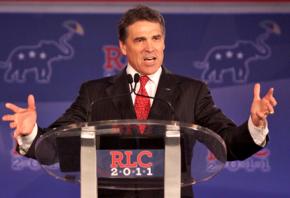The cuts that fed the Texas wildfires
documents the man-made causes of Texas' wildfire disaster.
AT LEAST four people are dead and more than 1,500 homes have burned to the ground as a result of some 200 wildfires that have ripped across Texas since the start of September.
With this tragedy unfolding, you'd think Texas Gov. and Republican presidential aspirant Rick Perry would be back in his home state, immersed in the emergency fire control and relief efforts--or at least pretending to be for the cameras.
But like a fiddling Nero of the 21st century, Perry barely managed to pop back to the state for a day before returning to the campaign trail--recalling George W. Bush's infamous flyover tour over hurricane-ravaged New Orleans after Katrina struck in 2005.
Never fear, though--Perry still has an action plan to insure the wellbeing of Texas residents. Campaigning in South Carolina, he remarked, "[J]ust keep those folks in your prayers, if you will, as we go back and try to get people out of harm's way...Pray for rain, as well."
Perry also castigated the federal government for not providing adequate aid in the crisis--which is highly ironic given his affinity for bashing "out-of-control spending" in Washington.

But if anyone's to blame for the insufficient response to the fires, it's Rick Perry and the Republicans who dominate Texas politics--and who have slashed the state budget, including for firefighting, to the bone.
The Texas Forest Service, the state agency charged with fire prevention, had its budget cut by $34 million--almost 30 percent--when the Texas legislature came up with a new budget a few months ago. This reduction in funding will in turn cut in half the money available for the grants it gives to volunteer fire departments to help purchase equipment.
These volunteer firefighters have overwhelmingly been on the front lines of the battle to tame the wildfires. There are 879 volunteer fire departments in Texas and only 114 paid fire departments, with another 187 departments that are a combination of both.
In many rural areas, volunteer fire departments rely on fish fries and other such activities to raise money for equipment. Now they face having to battle infernos on a shoe-string budget. "Our resources are about played out," one Central Texas fire chief told the Austin American-Statesman on the first day the fires broke out.
Chris Barron, director of the State Firemen's and Fire Marshals' Association of Texas, was on the scene in Bastrop County, just east of the capital of Austin and the epicenter of the worst blaze, where he reported: "I'm just sitting here with a fire chief...and his fuel budget for the year is already 60 percent over budget."
As early as last spring, volunteer firefighters were appealing to Texas politicians for help after funding declined by as much as 75 percent. "We've seen budget cuts, but this is the worst time that we've ever seen," Barron told reporters last March.
IT'S NOT as if this approaching disaster wasn't obvious to anyone with half a brain. Texas is experiencing its worst drought in recorded history, one that is expected to last into 2012. Some 66 millions trees will die in the Houston area alone, worsening air quality problems, destroying wildlife habitat and making the area warmer. Across the state, such desiccated vegetation, grass and trees provide unlimited tinder for dangerous fires.
Since the beginning of the year, there have been almost 19,000 wildfires in Texas, torching 3.5 million acres, an area greater than the size of Connecticut.
Yet with Perry's encouragement, the Texas legislature pressed forward with an all-cuts approach to closing a $27 billion budget deficit. Ironically, the legislature neglected to use over $6 billion stashed away in a "Rainy Day Fund"--because, as Perry insisted at the time, such funds would be needed in the event of a natural disaster.
Global warming is believed to be the cause of more frequent and extreme weather events--the cause of historic droughts in Western Europe and China and of destructive storms and floods from Pakistan to the northeastern the U.S.
But Perry doesn't buy it. In last week's Republican presidential debate, he declared that "the science is not settled" regarding the link between climate change and carbon emissions. So naturally, he's loathe to draw any connection between the fires and global warming--
The tragic fires in Texas are another example of the consequences of savage austerity--and the completely irrational political and economic system in which we live.


